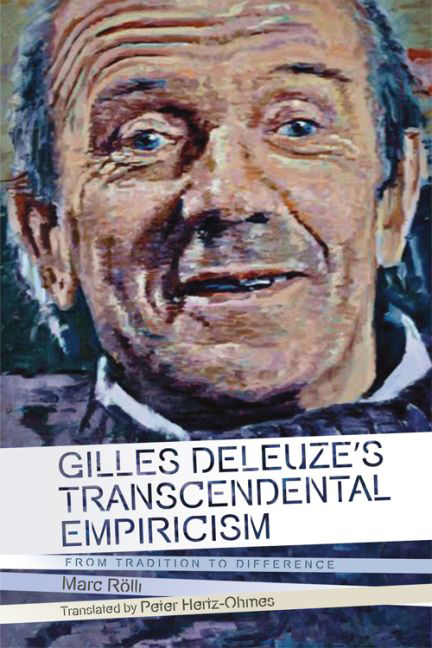Book contents
- Frontmatter
- Contents
- Translator's Note
- Author's Foreword
- Introduction: Can Empiricism Have a Transcendental Aspect?
- PART I EMPIRICISM/TRANSCENDENTALISM
- 1 Hume's Logic of External Relations
- 2 The Ambiguity of Kantian Thought
- 3 Kant's Transcendental Critique of Classical Empiricism
- PART II FROM PHENOMENON TO EVENT
- PART III DELEUZE'S TRANSCENDENTAL EMPIRICISM
- Conclusion: Where Do We Go from Here? Lines of Flight
- Bibliography
- Index
1 - Hume's Logic of External Relations
from PART I - EMPIRICISM/TRANSCENDENTALISM
Published online by Cambridge University Press: 27 April 2017
- Frontmatter
- Contents
- Translator's Note
- Author's Foreword
- Introduction: Can Empiricism Have a Transcendental Aspect?
- PART I EMPIRICISM/TRANSCENDENTALISM
- 1 Hume's Logic of External Relations
- 2 The Ambiguity of Kantian Thought
- 3 Kant's Transcendental Critique of Classical Empiricism
- PART II FROM PHENOMENON TO EVENT
- PART III DELEUZE'S TRANSCENDENTAL EMPIRICISM
- Conclusion: Where Do We Go from Here? Lines of Flight
- Bibliography
- Index
Summary
Hume's philosophy is a sharp critique of representation.
(Deleuze 1991: 30)Deleuze was twenty-eight when he wrote his study on Hume. This early exercise, published in Paris in 1953 under the title Empirisme et subjectivité. Essai sur la nature humaine selon Hume, stands somewhat isolated from his later achievements. Its peripheral existence has led some interpreters to reserve interest in the book, implying that it is not yet on the level of subsequent works. Nor can we presume to find in it a fundamental first draft of the philosophy of difference which Deleuze developed primarily in the 1960s. At the very least, however, the Hume book needs to be considered as a self-evident starting point for any attempt to present Deleuze as a possible empiricist. Indeed, it goes much further, for it introduces a radicalisation of classical empiricism by taking seriously Hume's logic of external relations.
The young Deleuze intentionally plays the doctrine of association off against sense-atomism to ground a theory of practical subjectivity. This brings to the fore his criticist distance regarding basic scientific assumptions in the empiricist theory of perception. In his implicit distancing, Deleuze not only puts forth certain theorems which prefigure a compelling radical empiricism, he also finds in Hume's philosophy itself the necessary prerequisites for its critical reactualisation. To get there he certainly allowed himself to be inspired by pluralist and pragmatist ideas stemming from William James, which were probably known to him through courses or books by Jean Wahl. Not for nothing does he designate Jean Wahl, apart from Sartre, as the ‘most important French philosopher’ (Deleuze and Guattari 1987: 57–8), exploring the ‘possibilities within empiricism […] on the non-Hegelian relations’ (Deleuze 1994: 311). In Les philosophies pluralistes d'Angleterre et d'Amerique Wahl states succinctly that the so-called ‘radical empiricism’ of William James is based on a logic of external relations which not only rejects classic atomism within sense-data theory, but also and in addition is accompanied by a critique of monistic-speculative philosophy and its theory of inner relations (Wahl 1920: 122f.).
- Type
- Chapter
- Information
- Gilles Deleuze's Transcendental EmpiricismFrom Tradition to Difference, pp. 23 - 33Publisher: Edinburgh University PressPrint publication year: 2016



